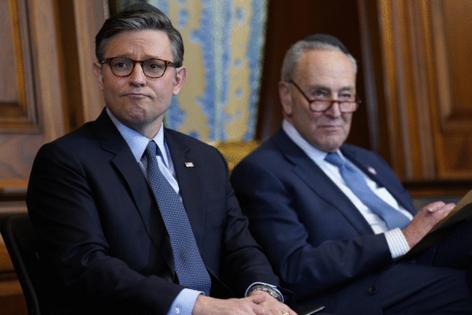US government funding fight previews House GOP turbulence
Published in Political News
WASHINGTON — House Speaker Mike Johnson’s struggle for a deal to keep the U.S. government open after Friday is an ominous sign for his shrinking and fractious Republican majority’s ability to push through President-elect Donald Trump’s early priorities.
The House and Senate have agreed to extend government funding into March, but battles among House Republicans over attaching funds to agriculture, disaster and other priorities threaten to take Congress right up to — and possibly slightly after — the deadline.
A deal, which includes some $29 billion to replenish the Disaster Relief Fund, more than $30 billion for agriculture programs, and billions more in assorted other disaster-related spending, was announced late Tuesday, leaving little time to spare to meet the tight deadline.
It’s the same fight between traditional Republicans and raucous conservatives that ultimately led to the ouster last year of Speaker Kevin McCarthy. But in the new Congress, Johnson will have an even smaller majority and a president eager to leverage Republican control of Washington.
Election losses, combined with Trump’s selection of three House Republicans to serve in his new administration, will leave the party with a one-vote swing margin through at least early April, when special elections will be held for vacancies.
That’s right in the middle of an anticipated push to quickly pass a budget blueprint on a party-line vote followed by partisan bills addressing U.S. border security, taxes and other budget-related issues.
Majority Leader Steve Scalise, Johnson’s top lieutenant, mentioned the narrow majority on Tuesday as he introduced Johnson at a press conference.
“The leader of the House today and the majority by the narrowest of margins in January,” Scalise said. “But it doesn’t matter. Having the majority is what’s important.”
Dealmaking
Johnson said Tuesday he and other negotiators were “almost there” on the year-end spending package to fund the government until March 14.
But some conservatives openly complained about the speaker’s bipartisan dealmaking on add-ons, which they deemed unnecessary.
“It’s the same pattern of behavior,” Representative Marjorie Taylor Greene of Georgia said, adding that money for farmers and natural disasters had become an excuse to further bloat government funding.
Several conservatives, including Tim Burchett of Tennessee, complained publicly about not seeing the text of a spending deal.
“Do you know what’s in the continuing resolution to fund the government?” he posted Monday on the social media platform X. “Neither do we.”
Greene predicted more Democrats than Republicans would ultimately vote for the package, an outcome that would infuriate Johnson’s right flank just weeks before a vote to reinstall him as speaker.
Johnson on Tuesday said he wasn’t concerned about keeping his gavel when the House votes for a speaker on Jan. 3.
He also dismissed any suggestions that any such fears had motivated some of his decisions on these negotiations.
But the reality is he only has his job because a restless few axed his predecessor for the first time in U.S. history.
_____
©2024 Bloomberg L.P. Visit bloomberg.com. Distributed by Tribune Content Agency, LLC.




























































Comments